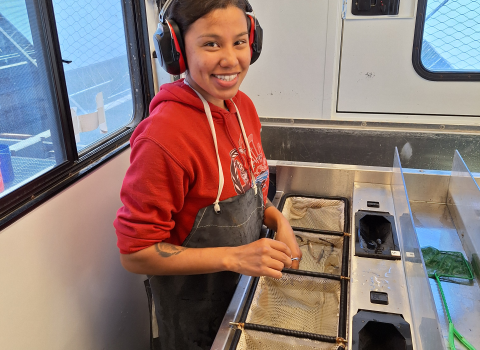Each group consists of a family of wolves; adults were held at the facilities for 12-14 months and offspring were born at the facilities in May 1998. The wolves from the Ladder Ranch include an adult male born at the Alameda Park Zoo in Alamogordo, New Mexico, in April 1995. Its mate was born at the Wild Canid Survival and Research Center in Eureka, Missouri, in April 1994. A fact sheet attached to this release provides additional information about both families of wolves to be delivered to acclimation pens this month.
The Engineer Springs pen is about 30 miles south of Alpine, Arizona. The Turkey Creek pen is 16 miles north of Clifton and 12 miles from the Engineer Springs pen. The wolves will be held in the pens for one to two months to become acclimated to their surroundings, and then be released into the forest. All wolves will wear brightly colored radio collars that will allow them to be monitored by wolf biologists and enhance their visibility if forest users encounter them. However, the wolves thick fur could obscure the collars and shooters remain responsible for accurately identifying their targets. "Were beginning this new year with a renewed sense of hope and purpose for Mexican wolf recovery," said Nancy Kaufman, Regional Director of the Services Southwest Region. "The wolves showed us last year they can adapt and survive in the wild. This year we will expand our monitoring, outreach, and law enforcement efforts to ensure theyre given the chance to survive and prosper.
Both the Ladder Ranch and Sevilleta National Wildlife Refuge house "preacclimation" facilities for wolves, where candidates for release into the wild can be housed and evaluated. The Ladder Ranch facility is a project of the Turner Endangered Species Fund which is cooperating in Mexican wolf recovery. There are currently a total of 40 facilities in the U.S. and Mexico that are holding and breeding Mexican wolves. The total population of Mexican wolves in these facilities is currently 187.
The two pairs of wolves released from the Engineer Springs and Campbell Blue pens on December 11, 1998, continue to explore their surroundings. An adult male and two-year-old female, released from the Engineer Springs pen have remained together, ranging up to 15 miles from their release pen. The pair from the Campbell Blue pen (an adult male and two-year-old female) split up after three days, but both individuals are doing well. Biologists hope those wolves will pair up when its time to breed, generally in February. The male members of these pairs were among the 11 wolves released in March 1998. After losing their mates, they were recaptured and held in acclimation pens with their new mates for about three weeks, then re-released.
Closures of a one-mile radius will be in effect during the time that wolves occupy the pens. The closures will be lifted once the wolves are released into the wild and leave the vicinity of their pens.
We are much more confident now in these wolves ability to survive and thrive in the wild," said David Parsons, Mexican Wolf Recovery Leader for the Fish and Wildlife Service. "Now we need to place more emphasis on increasing human tolerance of wolves and eliminating illegal killing, which is the main factor preventing the return of the lobo to the Southwest."
The objective of the Mexican wolf recovery plan is to re-establish about 100 wolves in the Apache and Gila National Forests by releasing wolf pairs or family groups each year for about 5 years.
The wolf management team follows an adaptive management approach, meaning that future management decisions are based on evaluations of past results and new information. This allows agency managers to be responsive to unexpected events and emerging public concerns. Thus the numbers of wolves to be released and the timing of releases are periodically reviewed and adjusted. An example of this approach was the release of the two females in December to replace the lost mates of the two remaining males.
The U.S. Fish and Wildlife Service is the principal Federal agency responsible for conserving, protecting, and enhancing fish and wildlife and their habitats for the continuing benefit of the American people. The Service manages the 93-million-acre National Wildlife Refuge System comprising more than 500 national wildlife refuges, thousands of small wetlands, and other special management areas. It also operates 66 national fish hatcheries and 78 ecological services field stations. The agency enforces Federal wildlife laws, administers the Endangered Species Act, manages migratory bird populations, restores nationally significant fisheries, conserves and restores wildlife habitat such as wetlands, and helps foreign governments with their conservation efforts. It also oversees the Federal Aid program that distributes hundreds of millions of dollars in excise taxes on fishing and hunting equipment to state wildlife agencies.
Note to editors: the transfer of wolves to acclimation pens is not open to coverage by the news media. For copies of b-roll video footage and still photos, call Frosty Taylor, Information Officer, Arizona Game & Fish Department at 602-789-3223 after 4p.m., Friday, January 8, 1999.
Family History of Wolves Transferred to Acclimation Pens
Wolves from Ladder Ranch to Engineer Springs Pen
Male #183 Born at Alameda Park Zoo, Alamogordo NM, 4/19/95 Transferred to Living Desert State Park, Carlsbad NM, 2/19/97 Transferred to Ladder Ranch 12/9/97
Female #168 Born at Wild Canid Survival and Research Center, Eureka MO, 4/27/94 Transferred to Ladder Ranch 12/9/97
Female #554 and Males #555 and #556 born on 5/5/98 at Ladder Ranch.
Wolves from Sevilleta Wolf Management Facility to Turkey Creek Pen
Male #208 Born at Rancho los Encinos, Chihuahua, Mexico, 4/30/95 Transferred to Sevilleta wolf management facility 1/25/97
Female #191 Born at Wild Canid Survival and Research Center, Eureka, MO, 4/23/95 Transferred to Sevilleta facility 12/5/96
Females #562 and #563 born on 5/5/98 at Sevilleta facility.



